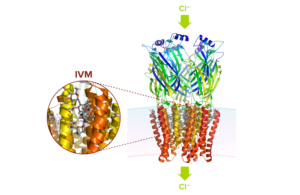
Ivermectin image courtesy of Wikipedia.
The antiparasitic drug ivermectin does not appear to be an efficacious COVID-19 treatment for mild COVID-19 cases, based on a randomized study recently published in JAMA.
Ivermectin — which is widely used in veterinary medicine to get rid of worms and other parasites— emerged as a potential COVID-19 treatment, owing to its ability to inhibit replication of the SARS-CoV-2 drugin in vitro and animal studies.
Similar research elevated hydroxychloroquine as a potential COVID-19 therapeutic agent, but the drug also has disappointed in human studies. The World Health Organization now cautions against its use as a COVID-19 treatment.
The ivermectin recipients in the Colombian study had a slightly faster resolution of symptoms than the placebo arm. The median time to resolution was 10 days in the ivermectin group versus 12 for placebo recipients. The number of patients in the ivermectin group who required escalation of care was 2% compared to 5% with placebo.
Overall though, the differences between the two arms were not statistically significant.
Ivermectin has been commonly used as a COVID-19 therapy in Latin America and elsewhere despite uncertain clinical benefits.
Like hydroxychloroquine, the drug has also won favor from non-medical experts extolling its purported benefits online. According to Science Alert, there has been a recent increase in reports of people poisoning themselves with the drug — in some cases because they acquired horse-sized doses from veterinary sources.
The editors of Frontiers in Pharmacology recently retracted an article supporting the drug in patients infected with COVID-19, saying it lacked scientific rigor. The publication also issued a statement stressing that it “takes no position on the efficacy of ivermectin as a treatment of patients with COVID-19, however, we do take a very firm stance against unbalanced or unsupported scientific conclusions.”
A separate study, a preprint meta-analysis involving 7,412 participants, found that ivermectin was not associated with reduced mortality or reduced patient recovery.
NIH has concluded that scientific data are lacking to make a recommendation “for or against the use of ivermectin for the treatment of COVID-19.”
Filed Under: clinical trials, Drug Discovery, Infectious Disease




The number who were admitted to the hospital at the end of the study was 60% lower for the ivermectin group. Although the study was not highly powered (or did not have a large enough number of participants to determine the significance of this number), it may be combined with other studies in a meta-study and be more highly powered and show significance in reducing the number greatly who progress to more serious stages of the illness.
I caught COVID-19. I started Ivermectin 3 hours after symptoms started. I was symptom free in 30 hours. The person who gave me the virus was in the hospital for 2 weeks and remains on portable oxygen a month later. Ivermectin will never get approval as long as there is huge money to be made with vaccines. Period.
This study accepted by JAMA had several flaws that under normal circumstances would be rejected by any journal.
1. For two weeks patients in the control arm were inadvertently given ivermectin. Though the data from these persons during these weeks were discarded, this shows evidence of lack of control of medicine distribution.
2. The area from which the patients were selected is one where local distribution of ivermectin had been made available OTC. The patients may have taken ivermectin > 5 days before their incorporation into the trial, and not have been rejected for testing.
3. The rate of progression to greater severity of illness was unusually low in the control group, very close to the ivermectin arm, raising the strong possibility of contamination of the control arm with patients taking, or having previously taken ivermectin on their own.
There are several other objections to the results, which can be seen in comments posted to the study’s article in JAMA.